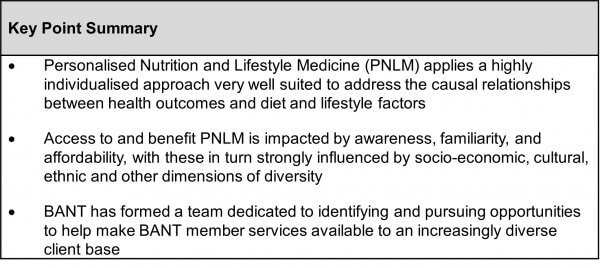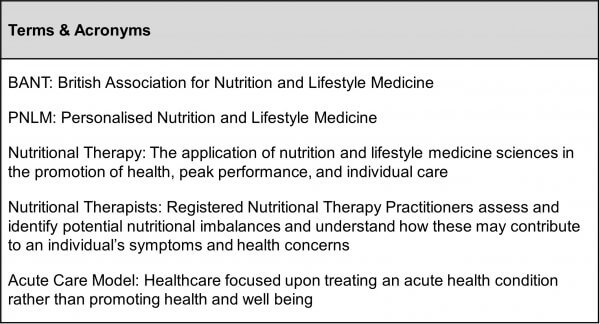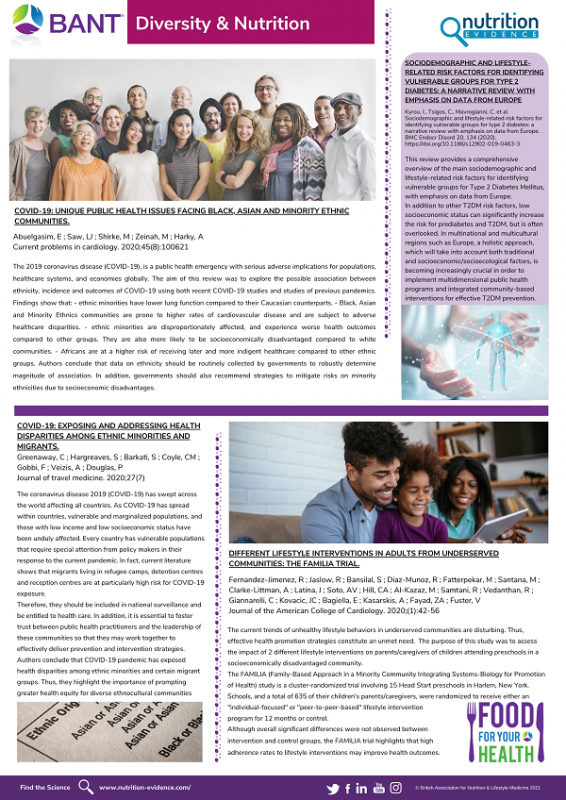
14 Jul 2021 Broadening Diversity and Inclusion in Personalised Nutrition and Lifestyle Medicine
Addressing the rise in non-communicable disease, lifestyle choices and health inequalities


The shift in prevalence from acute to chronic diseases is creating an unsustainable burden on healthcare systems. (1) Such diseases tend to be of longer duration, and there is a growing recognition that many of today’s chronic or non-communicable diseases are the result of complex and lifelong interactions between diet, environment, lifestyle, and genes. The majority are therefore, at least in part lifestyle-driven, and may be preventable or reduced through changes in modifiable risk factors. (2)
Personalised Nutrition and Lifestyle Medicine (PNLM) applies nutrition and lifestyle concepts to understand and address the root causes of chronic conditions and develop personalised diet and lifestyle recommendations to drive health improvements. However, socio-economic factors, education and aspects of inclusivity often lead to services with high potential value being unavailable to the individuals who need them most therefore compounding existing health inequalities. For example, the highly personalised one-to-one support from Registered Nutritional Therapists to select, apply and evaluate approaches with the best fit to address health issues and goals for a specific patient are not available via the NHS nor reimbursable under medical insurance cover, presenting a significant cost barrier to access. This highlights the value and opportunity of making services more accessible to patients and consequently to encourage more practitioners into the profession.
Personalised Nutrition and Lifestyle Medicine is diverse by nature
Nutritional Therapy is the application of nutrition and lifestyle medicine sciences in the promotion of health, peak performance and individual care. Within its clinical application it identifies recommendations specific to the causal factors of health conditions. (3) The PNLM approach embraces the uniqueness of each person and places the patient at the centre of care. This approach contrasts with models of care that apply recommendations without regard to individual differences in need, response, or practical ability to apply sustainably. A grounding principle for this approach is that diet and lifestyle are recognised as modifiable risk factors and addressing the most relevant risk factors for an individual offers high value. It also centres around establishing a trusting and sustained relationship between therapist and client. (3)
The acute care healthcare model is characterised by rapid diagnosis and the prescription of short-term interventions and medications to ameliorate symptoms, often with minimal patient engagement, education and coaching. In contrast, Nutritional Therapy Practitioners work with individuals, recognising and understanding their biochemical and lifestyle individuality to provide relevant recommendations for diet and lifestyle. Both approaches are fundamental to an integrated healthcare model that employs both prevention and treatment.
Diet, socio-economic status and chronic disease
The risk of developing non-communicable disease is correlated with socio-economic status (4), as is diet (5,6,). To compound this, socio-economic status and education are known to be important determining factors for accessing nutrition and lifestyle management services. Nutritional Therapy is essentially private health care, and the self-funded direct payment required may well present a significant barrier to access for many individuals that would benefit greatly. The COVID-19 pandemic may have amplified health issues and inequalities and yet it is not only socio-economic factors that are creating barriers. There is also a need to address ethnic, religious and social factors, to expand awareness, appeal and accessibility to a far broader demographic.
With this in mind, BANT has committed to the shared objectives of making personalised nutrition and lifestyle medicine part of an integrated healthcare system that recognises the role of individual health alongside that of community and population health. BANT has also begun an initiative dedicated to growing the accessibility of Nutritional Therapy to more diverse groups. The initiative recognises both the supply and demand challenges, therefore pursuing enablers for greater diversity within both the client and practitioner population bases. BANT Volunteer & Networks Manager Benjamin Richardson, leading the initiative, welcomes all contact for expressions of interest and potential contribution.
Group and community-based approaches
There is a need for creative and sustainable ways to extend services and help disadvantaged communities make more informed lifestyle choices. Many practitioners have significant desire to deliver valuable support for less privileged and vulnerable groups. However, the demands of earning a living income present a real and practical challenge and limit on capacity. Some have successfully found support from funding providers and organisations which enables them to deliver programmes to such groups. Increasing practitioner awareness of how to find and access such support is part of the BANT initiative to increase the diversity of those that can benefit from their members services.
Group or community programmes can provide an effective platform to connect with people and understand their day-to-day challenges. For example, communal growing and preparing of food can be used as a wonderful medium for bringing people together. Such a setting can enable advice relevant for key areas of concern, such as heart health, diabetes and weight management, to be delivered in a more social, collaborative & inviting way and avoid appearing judgemental or patronising.
Embracing Ethnic & Cultural Difference
Many drivers of chronic disease are routed in behaviour linked to the wider social environment and community cultures. Food and lifestyle choices are often influenced by background and cultures (7) and every population has different belief systems, religious implications, diets, health issues and wellness practices. The growing ethnic diversity of the population brings further challenges of communication and adverse impact of the Western diet on a genetically diverse population. (1) This is highlighted by the increased risk of chronic conditions such as insulin resistance and type 2 diabetes amongst certain ethnic minorities. (8) Language barriers and cultural sensitivities can lead to miscommunication; if individuals are not able or actively encouraged to communicate their health concerns, they are unlikely to seek help.
It is important for practitioners to be “culturally competent” and have a good understanding of patient background to build rapport with diverse groups. Recommendations need to be culturally sensitive and relevant, embracing rather than excluding the foods different cultures use, and programmes need to be adapted to their needs. This involves access to education and resources as well as diversification of the practitioner base. Diversity in all its forms, including income, ethnicity, sexuality, gender, age and more. This highlights the opportunity for education providers to play a role by increasing awareness of Nutritional Therapy as a career to a more diverse audience and support practitioners from a range of backgrounds.
Aspects of gender and sexuality
Barriers relating to gender and sexuality must also be considered. The sector is largely dominated by women and there is a need for more male practitioners to join the profession to bring a wider perspective.
For those working with LBGTQ+ communities there is a need for focussed diet and lifestyle recommendations to serve these groups. Many avoid diet and lifestyle services because they are reluctant to discuss certain health issues or topics. It is important for practitioners to have a good understanding of relevant health issues and to use open and inclusive language.
Growing diversity and inclusion in Nutritional Therapy
The above issues highlight the need to make Nutritional Therapy more accessible, supporting and encouraging practitioners from a range of backgrounds and making Nutritional Therapy services available to the widest possible audience. This will require a range of initiatives; from finding ways to make services more accessible from a financial standpoint, to ensuring practitioners are equipped to support the unique needs of different groups and further, collaborating with training providers to increase awareness and accessibility of Nutritional Therapy as a profession.
With this in mind, BANT launched two important initiatives earlier in 2021 to formally address some of the challenges discussed. Firstly, the Food for your Health campaign has been launched to provide open access to a range of tools and resources to introduce the public to nutrition and lifestyle medicine in relation to diet-induced metabolic conditions. Secondly, a dedicated team has been established to identify and pursue opportunities for growing diversity. One of the first planned deliverables are materials and education to help BANT members find the funding that can enable them to engage in community work, addressing the barrier of doing so whilst maintaining a living income.
Personalised Nutrition and Lifestyle Medicine is diverse by nature – they apply evidence-based diet and lifestyle recommendations at an individual level to facilitate and support positive change. However, there is work to be done to raise awareness of and access to Nutritional Therapy amongst a broader audience, from both a practitioner and client point of view.
END –
Acknowledgments:
Lead Author – Julie Scott, Registered Nutritional Therapy Practitioner, MSc Personalised Nutrition, mBANT, CNHC
Contributing Author – BANT Volunteer & Networks Manager Benjamin Richardson, D&I Project Leader.
Communications & Editorial Support – BANT Communications Manager Claire Sambolino & BANT Council Representative Jessica Fonteneau
 PoliticsHome – delivering fast, comprehensive, objective PR straight to Westminster to connect with politicians, officials and experts from across the political & healthcare spectrum.
PoliticsHome – delivering fast, comprehensive, objective PR straight to Westminster to connect with politicians, officials and experts from across the political & healthcare spectrum.
Visit our Politics Home portal for the latest press releases from BANT
https://www.politicshome.com/members/article/we-must-broaden-diversity-and-inclusion-in-personalised-nutrition-and-lifestyle-medicine?previewkey=225b81ac77255f9a0d4909bb9d1497c0
 Nutrition Evidence Database, affectionately known as NED, is the only comprehensive, scientific database that specialises in nutrition and lifestyle medicine, with a focus on high-quality papers selected to provide the best evidence available for clinical interventions recommended by BANT Nutrition Practitioners. Receive a free monthly e-mail digest by subscribing for free.
Nutrition Evidence Database, affectionately known as NED, is the only comprehensive, scientific database that specialises in nutrition and lifestyle medicine, with a focus on high-quality papers selected to provide the best evidence available for clinical interventions recommended by BANT Nutrition Practitioners. Receive a free monthly e-mail digest by subscribing for free.
Download our latest NED info-Bite with some of the latest research in this area: https://bant.org.uk/wp-content/uploads/2021/07/05o_BANT-NED-Info-Bites_Diversity-Nutrition.pdf
URL Links:
British Association for Nutrition & Lifestyle Medicine (BANT) website – https://bant.org.uk/
BANT Diversity & Personalised Nutrition Video “We are all different” – https://www.youtube.com/watch?v=-7dfmavfHFE&t=9s
BANT Food for your Health Campaign – https://bant.org.uk/food-for-your-health/
About Personalised Nutrition – https://bant.org.uk/personalised-nutrition/
Nutrition Evidence Database – https://bant.org.uk/nutrition-evidence-database/
Nutrition Evidence Alert – Diversity – Influences of Ethnic and Social Backgrounds – https://bant.org.uk/2021/05/07/nutrition-evidence-alert-april-2021/
References:
(1) Hofmann, L., Jones, D. and Quinn, S. 21st Century Medicine: A New Model for Medical Education and Practice. The Institute of Functional Medicine. Available from: https://www.faim.org/21st-century-medicine-a-new-model-for-medical-education-and-practice
(2) Introduction to NCD Epidemiology [Presentation]. Centre for Disease Control. https://www.cdc.gov/globalhealth/healthprotection/fetp/training_modules/1/Intro-to-Epi_PPT__Final_09252013.pdf [Accessed 9th June 2021]
(3) Harris, M. and Benbow, A. Evaluating the Effectiveness of Nutritional Therapy in the McClelland Teaching Clinic at the University of Worcester. Online Journal of Complementary & Alternative Medicine Research Article. 2021. Available from: https://irispublishers.com/ojcam/pdf/OJCAM.MS.ID.000637.pdf
(4) World Health Organisation. Non-communicable diseases. Available from: https://www.who.int/news-room/fact-sheets/detail/noncommunicable-diseases [Accessed 9th June 2021]
(5) Novaković R, Cavelaars A, Geelen A, et al. Socio-economic determinants of micronutrient intake and status in Europe: a systematic review. Public Health Nutr. 2014;17(5):1031-1045. doi:10.1017/S1368980013001341
(6) Abreu S, Santos R, Moreira C, Santos PC, Mota J, Moreira P. Food consumption, physical activity and socio-economic status related to BMI, waist circumference and waist-to-height ratio in adolescents. Public Health Nutr. 2014;17(8):1834-1849. doi:10.1017/S1368980013001948
(7) Monterrosa EC, Frongillo EA, Drewnowski A, de Pee S, Vandevijvere S. Sociocultural Influences on Food Choices and Implications for Sustainable Healthy Diets. Food Nutr Bull. 2020 Dec;41(2_suppl):59S-73S. doi: 10.1177/0379572120975874. PMID: 33356592.
(8) Meeks KA, Freitas-Da-Silva D, Adeyemo A, et al. Disparities in type 2 diabetes prevalence among ethnic minority groups resident in Europe: a systematic review and meta-analysis. Intern Emerg Med. 2016;11(3):327-340. doi:10.1007/s11739-015-1302-9

